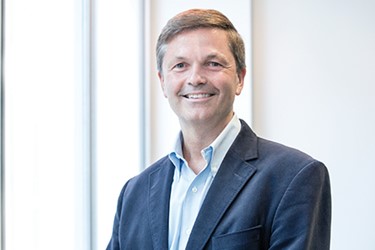Why Orchard Therapeutics Mark Rothera Is A Rare Disease Champion

By Rob Wright, Chief Editor, Life Science Leader
Follow Me On Twitter @RfwrightLSL

It was 1998 when Mark Rothera first joined a rare disease company. “It was called PathoGenesis, and I was the fifth employee in Europe,” reflects the now president and CEO of Orchard Therapeutics who is featured in the June issue of Life Science Leader magazine. PathoGenesis had been working on a drug called Tobi for cystic fibrosis (CF). “Patients with CF have terrible infections, and this was the first inhaled antibiotic for these patients, which gained FDA approval in 1997,” he recalls. Rothera came on board as the company’s European commercial director and was charged with building operations to launch Tobi in the EU, which gained EMA approval in December 1999. “Back then, there weren’t so many companies focused on rare diseases, and working for PathoGenesis gave me a sense for the space’s high unmet medical need,” he shares.
The company was acquired by Chiron in 2001, and Rothera stayed through the acquisition until the announcement of Chiron being acquired by Novartis in October of 2005. From there he joined Shire Human Genetic Therapies (HGT) where he was responsible for building operations and distribution partnerships across 40 countries, facilitating the launch of three novel orphan drugs. “I remember being invited to an end of Phase 3 celebration for kids with Hunters syndrome, or mucopolysaccharidosis type II (MPS II), a lysosomal storage disease caused by a deficiency of the lysosomal enzyme iduronate-2-sulfatase (I2S),” he remembers. “They have coarse features. Their hair is like wire. They have dwarfism. All of their organ systems are affected by the fact that this substrate that should be broken down isn’t, and gradually just fills out all the organs and cells.” According to Rothera, these children had been on weekly enzyme replacement therapy as part of a three-year Phase 3 clinical trial, which meant most had to leave their hometown and decamp to a nearby hospital to take part. The celebration included everyone connected to the study’s ecosystem (e.g., children, parents and clinicians). “There was a disco, and everybody was on the floor celebrating,” he recalls. Rothera, found the experience incredibly moving. “I thought, these kids have given three years of their life to take part in this trial, and you could see it meant the world to them,” he says. The celebration clarified for Rothera how the trial’s execution required more than just an extraordinary effort by so many people. “Leadership starts with having a great purpose, and it was there that I realized how working in rare and orphan diseases is an incredibly purpose driven experience,” he concludes.
